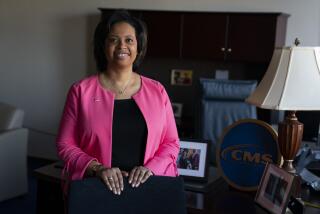Many Home-Care Firms Unqualified, Study Says
- Share via
WASHINGTON — Unqualified entrepreneurs are swarming into the home health-care business to reap potentially vast profits from the Medicare program, and the government is unlikely to stem the tide of fraud and abuse any time soon, according to federal investigators.
Even as spending for home care multiplied more than sixfold from 1989 to 1996, Congress has cut the money available to Medicare for audits and examinations, the General Accounting Office says in a report to be issued today at a hearing of the Senate Special Committee on Aging.
As a result, the GAO says, Medicare audited only 3% of all home-care claims filed last year, compared with 60% in the 1980s.
“Our ongoing work suggests that it is simply too easy to become Medicare-certified” as a home health agency, concludes the GAO, an investigative arm of Congress. Because Medicare does not require owners of home health agencies to have any experience in health care, the GAO says, agencies have been opened by taxi drivers and pawnshop operators.
“You get the impression that any kid who could set up a lemonade stand for summer sales can get into the home health-care business,” said committee Chairman Charles E. Grassley (R-Iowa).
When Medicare was begun in 1965, Congress restricted free home health care to those who had undergone surgery or other major hospital procedures and were recovering at home.
Eligibility requirements were eased beginning in 1989, and care is now available to all those certified by a doctor as homebound and in need of help. The services can include such things as physical therapy, help with injections and medications and even nonmedical care such as help with dressing, bathing and preparing meals. As a result, Medicare spending for home care soared from $2.6 billion in 1989 to $17.7 billion last year, and the number of people served jumped from 1.7 million to 3.9 million. The number of agencies certified by Medicare to provide home-care services nearly doubled from 5,692 in 1989 to 10,133 now.
“We’ve had a tremendous expansion of coverage with the absence of adequate review mechanisms,” Grassley said. “This has opened the door to increased waste, fraud and abuse.”
The GAO report said: “Once certified, there is little likelihood of an agency being terminated from the program or otherwise penalized, even when it has been repeatedly cited for not meeting Medicare’s conditions of participation and providing substandard care.”
An inexperienced person in California started an agency in 1992, according to the report, and within a year, Medicare had received complaints “alleging that the agency had served patients ineligible for the Medicare benefit, falsified medical records, falsified the credentials of the director of nursing and used staff inappropriately.”
The agency collected $6 million from Medicare before closing in September 1993. “The owner, a former drug felon, and an associate later pleaded guilty to defrauding Medicare of over $2.5 million,” the GAO noted.
The government has to recertify home-care agencies regularly, but the GAO charges that it does not require them to correct any deficiencies uncovered by occasional government inspections. Those deficiencies include the diversion of funds to personal use by the agency owners.
Hoping to slow the spurt in spending, the Clinton administration has proposed converting the payment mechanism for home care to one similar to that in place for Medicare payments. The cost of treating a condition would be set in advance, limiting the amount home-care agencies could receive from the government for treating individual beneficiaries.
The Senate-passed version of the budget bill requires Medicare beneficiaries to pay $5 of the cost of each home-care visit. Both the Clinton administration and advocacy groups for the elderly oppose this provision, however, and it is considered unlikely to survive.
More to Read
Inside the business of entertainment
The Wide Shot brings you news, analysis and insights on everything from streaming wars to production — and what it all means for the future.
You may occasionally receive promotional content from the Los Angeles Times.










